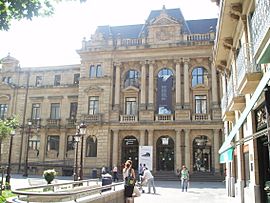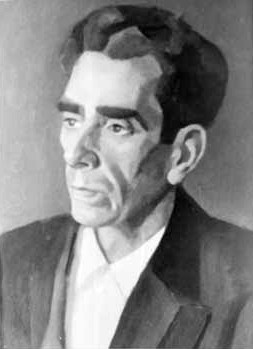Koldo Mitxelena facts for kids
Koldo Mitxelena Elissalt (born in 1915 in Errenteria, Gipuzkoa, and died on October 11, 1987, in San Sebastián) was a very important Basque expert in languages. He was also known as Luis Michelena. He taught about languages at the University of the Basque Country. Koldo Mitxelena was also a member of the Royal Academy of the Basque Language, which is like a special group that looks after the Basque language.
Many people say he was "the greatest scholar the Basque language has ever seen." He is famous for figuring out what Proto-Basque (an ancient form of the language) was like in the 1950s. He also showed in 1954 that the Aquitanian language was an older version of Basque. Mitxelena was a key person in creating "Euskara Batua," which is the Standard Basque language used today. In 1987, his hometown of Errenteria called him Seme Kuttun, which means 'beloved son'.
Koldo Mitxelena's Life Story
Early Life and Learning
Koldo Mitxelena grew up in a family that made things for a living. When he was a child, he was sick for a long time and had to stay in bed. This made him love reading and also made him very interested in the Basque language.
His family supported Basque culture and identity. When he was young, he joined groups like the Euskal Langileen Alkartasuna and the Basque Nationalist Party. He also learned from a youth group called Euskaltzaleak. He started working in a factory but kept studying and going to meetings. This was when he became interested in Basque books written before the war.
War and Prison Experiences

When the Spanish Civil War started in 1936, Mitxelena joined the Basque nationalist army to fight. He was captured and sentenced to death in 1937. However, his sentence was changed to 30 years in prison. He spent time in different prisons, including El Dueso, Larrinaga, and Burgos.
In the Burgos prison, he met many smart people and university teachers. One of them, Francisco Jordá, who later became an archaeology professor, encouraged him to study at a university. It was hard for him to start until 1948. Two books, a Spanish grammar book and a history book, really inspired him. He was released from prison on January 13, 1943, after more than five years.
Another Time in Prison
When Mitxelena returned home at 27, he was not well. A businessman offered him a job in Madrid. He took the job and also started working secretly against the government. Many people hoped that the Allied Forces winning World War II would make the Franco government fall.
On April 10, 1946, Mitxelena was arrested again because of his activities with political groups. He was sentenced to two years in prison. He was released on January 30, 1948, after being in several more prisons.
Studying and Growing Intellectually
In 1948, Mitxelena was back in Errenteria. He enrolled at the University of Madrid to study philosophy and literature, thanks to his friend from prison, Francisco Jordá. The 1950s and 1960s were very important for Mitxelena's mind. He learned a lot and developed many ideas. However, he was very poor and had to work many jobs to live. It was hard to find a steady job because of his past prison record. Luckily, some friends knew how smart he was and helped him.
In 1949, he married Matilde Martínez de Ilarduya. In 1951, he took part in a workers' strike.
Teaching at University
In 1954, he became the director of the Julio de Urquijo School of Basque Philology. He also joined the team that edited the magazine Egan. Around the same time, his friend Antonio Tovar asked him to teach classes in Salamanca. In 1958, he became the first professor to teach Basque Language and Literature at Salamanca University. He earned his doctorate degree in 1959. In 1968, he became a professor of Indo-European linguistics. This time in Salamanca was one of the happiest for him and his family.
Creating Unified Basque Language
While teaching in Salamanca, the Royal Academy of the Basque Language gave him a big job: to help unify the written Basque language. This was important because different ways of writing caused arguments. Mitxelena believed that the unified Basque language should be based on the most useful central Basque dialects. He also understood what young Basque speakers wanted for the future of their language.
Teaching in Paris
After some big changes in French universities in 1968, Mitxelena taught about Basque languages at the Sorbonne from 1969 to 1971. He became good friends with a famous linguist named André Martinet. Mitxelena often visited Martinet's home and became part of his group of friends and scientists.
A Smart and Diverse Thinker
Mitxelena was truly passionate about languages and knew many of them. But he also loved reading all kinds of books, even detective novels. He was interested in movies too and wrote many interesting reviews about them in Basque. People often asked him to be a judge at cultural events. They also asked for his advice on education and culture.
Back in the Basque Country
During the time when Spain was changing to a democracy, Mitxelena was still in Salamanca. But he stayed connected to the Basque Country. He helped with important projects there, like creating the University of the Basque Country (EHU-UPV). From 1978, Mitxelena taught at the EHU-UPV. He helped train the first group of Basque language experts. Mitxelena also spent many years working on a big Basque dictionary. The first part of the General Basque Dictionary was published in 1987, but he sadly passed away that same year and did not get to see it. Later, Ibon Sarasola, who worked with Mitxelena, finished the dictionary in 2005.
Important Works by Koldo Mitxelena
Koldo Mitxelena wrote 12 books, 260 articles, and 236 reviews. Here are some of his important works:
- "Apellidos vascos" ("Basque Surnames") (1955)
- "Historia de la literatura vasca" ("History of the Basque Literature") (1960)
- "Fonética histórica vasca" ("Historical Phonetics of Basque") (1961)
- "Lenguas y protolenguas" ("Languages and Proto-Languages") (1963)
- "Textos arcaicos vascos" ("Ancient Basque Texts") (1964)
- "Sobre el pasado de la lengua vasca" ("On the History of the Basque Language") (1964)
- "Mitxelenaren idazlan hautatuak" ("Selected Writings of Mitxelena") (1972)
- "Koldo Mitxelena. Euskal idazlan guztiak" ("Koldo Mitxelena. Complete Basque Writings") (1988)
- "Orotariko euskal hiztegia" ("General Basque Dictionary") (1987–2005)
See also
 In Spanish: Koldo Mitxelena para niños
In Spanish: Koldo Mitxelena para niños
- Proto-Basque
- Basque people
- Basque Country


